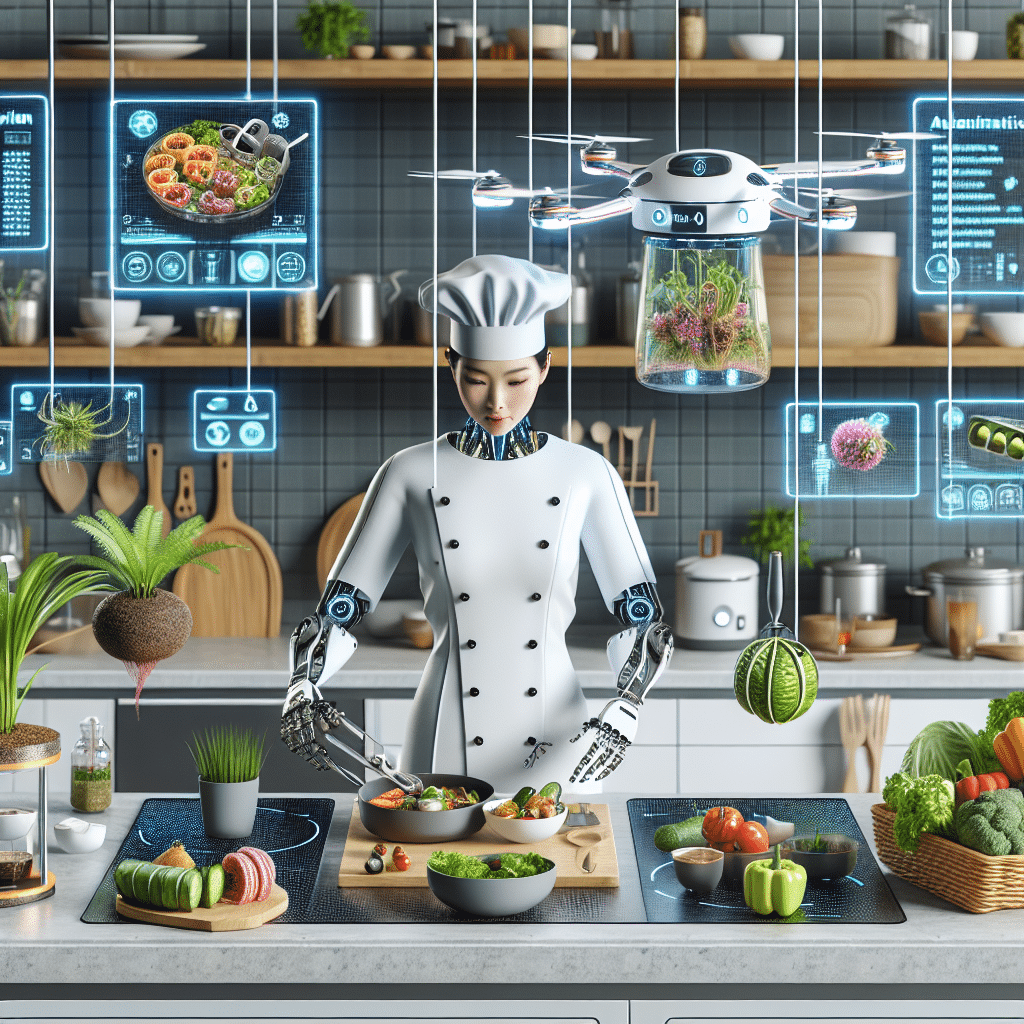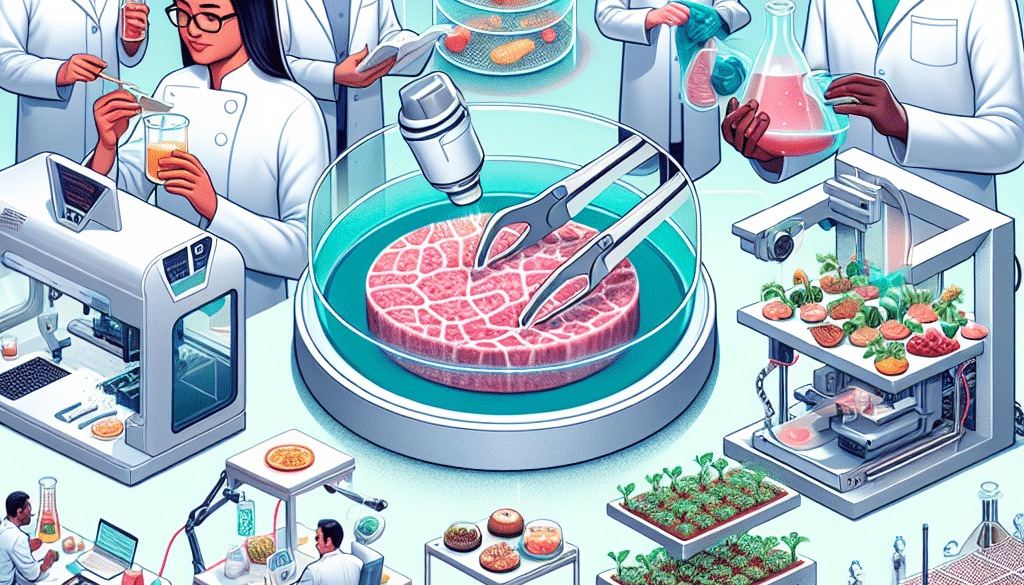Innovations Shaping the Future of Food Technology
-
Table of Contents
- Innovations Shaping the Future of Food Technology
- 1. Cellular Agriculture and Lab-Grown Meat
- 2. Precision Fermentation
- 3. Plant-Based Proteins and Alternatives
- 4. Vertical Farming and Controlled Environment Agriculture (CEA)
- 5. Food Waste Reduction Technologies
- 6. Personalized Nutrition and AI
- 7. Blockchain for Food Traceability
- Conclusion
- Discover ETprotein’s High-Quality Protein Products
Innovations Shaping the Future of Food Technology

The food industry is undergoing a transformation, driven by innovative technologies that are reshaping how we produce, process, and consume food. These advancements aim to address global challenges such as food security, sustainability, and nutrition. In this article, we will explore the cutting-edge innovations that are setting the stage for a revolution in food technology.
1. Cellular Agriculture and Lab-Grown Meat
One of the most groundbreaking developments in food technology is cellular agriculture, particularly the production of lab-grown meat. This process involves cultivating animal cells in a controlled environment to create meat without the need to raise and slaughter animals. Companies like Memphis Meats and Mosa Meat are leading the charge, with the potential to reduce the environmental impact of livestock farming and meet the growing demand for protein.
- Reduction in greenhouse gas emissions
- Decreased land and water usage
- Elimination of antibiotics and hormones from meat production
2. Precision Fermentation
Precision fermentation is a process that uses microorganisms to produce complex organic molecules like proteins and fats. This technology enables the creation of ingredients that can replace animal-derived products. Perfect Day, for example, uses fermentation to produce dairy proteins without cows, offering a sustainable and ethical alternative to traditional dairy.
- Lower environmental footprint compared to animal farming
- Ability to produce dairy proteins that are lactose-free and hypoallergenic
- Scalability to meet global nutritional needs
3. Plant-Based Proteins and Alternatives
The rise of plant-based proteins has been meteoric, with companies like Beyond Meat and Impossible Foods leading the way. These companies use a variety of plant ingredients to mimic the taste and texture of meat, offering a more sustainable and ethical option for consumers.
- High-protein content from sources like peas, soy, and beans
- Lower carbon footprint compared to animal protein production
- Appeal to a growing demographic of health-conscious and environmentally aware consumers
4. Vertical Farming and Controlled Environment Agriculture (CEA)
Vertical farming and CEA are innovative approaches to crop production that use stacked layers in a controlled environment to grow plants. These methods allow for year-round farming, efficient use of space, and reduced water usage. Companies like AeroFarms and Plenty are at the forefront of this technology, producing fresh produce closer to urban centers.
- Optimized growth conditions for higher yields
- Reduced transportation costs and emissions
- Minimized use of pesticides and herbicides
5. Food Waste Reduction Technologies
Food waste is a significant global issue, with substantial economic, environmental, and social impacts. Innovations in food preservation, such as Apeel Sciences’ plant-derived coating that extends the shelf life of produce, are making strides in reducing waste. Additionally, apps like Too Good To Go connect consumers with restaurants and stores to purchase surplus food at a discount.
- Extended shelf life of fresh produce
- Reduction in the carbon footprint associated with food waste
- Improved food security by diverting edible food from landfills
6. Personalized Nutrition and AI
Artificial intelligence (AI) is revolutionizing personalized nutrition by analyzing individual dietary needs and preferences. Companies like Habit use AI to provide personalized meal plans and nutrition advice, helping consumers make better food choices for their health.
- Customized dietary recommendations based on genetic, metabolic, and lifestyle factors
- Integration with wearable technology for real-time health monitoring
- Enhanced consumer engagement and adherence to dietary plans
7. Blockchain for Food Traceability
Blockchain technology is being applied to the food supply chain to enhance traceability and transparency. By creating a secure and immutable ledger of transactions, blockchain can track the journey of food products from farm to table. IBM’s Food Trust is one such initiative that brings together retailers, suppliers, and growers to ensure food safety and authenticity.
- Increased consumer confidence in food safety and origin
- Improved recall efficiency in case of foodborne illness outbreaks
- Support for fair trade practices and verification of organic and non-GMO claims
Conclusion
The future of food technology is bright, with innovations that promise to improve sustainability, nutrition, and food security. From lab-grown meat to AI-driven personalized nutrition, these advancements are set to transform the food industry. As we embrace these changes, it is crucial to consider the ethical and societal implications to ensure that the benefits are shared by all.
Discover ETprotein’s High-Quality Protein Products
In line with the innovative trends in food technology, ETprotein offers a range of high-quality protein products that cater to the evolving needs of the industry. Their organic bulk vegan proteins and L-(+)-Ergothioneine are perfect for businesses looking to incorporate sustainable and nutritious ingredients into their offerings.
ETprotein’s commitment to non-GMO, allergen-free, and high-purity products makes them an ideal partner for companies in the nutraceutical, pharmaceutical, cosmeceutical, and food and beverage industries. To explore how ETprotein can enhance your product line with their exceptional protein solutions, contact them at sales(at)ETprotein.com.
About ETprotein:
ETprotein, a reputable protein and L-(+)-Ergothioneine (EGT) Chinese factory manufacturer and supplier, is renowned for producing, stocking, exporting, and delivering the highest quality organic bulk vegan proteins and L-(+)-Ergothioneine. They include Organic rice protein, clear rice protein, pea protein, clear pea protein, watermelon seed protein, pumpkin seed protein, sunflower seed protein, mung bean protein, peanut protein, and L-(+)-Ergothioneine EGT Pharmaceutical grade, L-(+)-Ergothioneine EGT food grade, L-(+)-Ergothioneine EGT cosmetic grade, L-(+)-Ergothioneine EGT reference grade and L-(+)-Ergothioneine EGT standard. Their offerings, characterized by a neutral taste, non-GMO, allergen-free attributes, with L-(+)-Ergothioneine purity over 98%, 99%, cater to a diverse range of industries. They serve nutraceutical, pharmaceutical, cosmeceutical, veterinary, as well as food and beverage finished product distributors, traders, and manufacturers across Europe, USA, Canada, Australia, Thailand, Japan, Korea, Brazil, and Chile, among others.
ETprotein specialization includes exporting and delivering tailor-made protein powder and finished nutritional supplements. Their extensive product range covers sectors like Food and Beverage, Sports Nutrition, Weight Management, Dietary Supplements, Health and Wellness Products, and Infant Formula, ensuring comprehensive solutions to meet all your protein needs.
As a trusted company by leading global food and beverage brands and Fortune 500 companies, ETprotein reinforces China’s reputation in the global arena. For more information or to sample their products, please contact them and email sales(at)ETprotein.com today.














